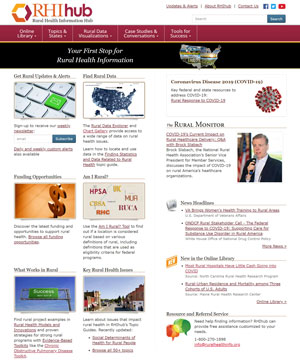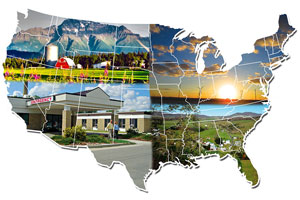Your First Stop for Rural Health Information
By Jena Pierce on
 For nearly two decades, a variety of
rural stakeholders, including healthcare providers, local
governments, public health units, and state and national
organizations, have been getting the help, resources, and
guidance they need from the Rural Health
Information Hub (RHIhub) website.
For nearly two decades, a variety of
rural stakeholders, including healthcare providers, local
governments, public health units, and state and national
organizations, have been getting the help, resources, and
guidance they need from the Rural Health
Information Hub (RHIhub) website.
RHIhub staff are located at the Center for Rural Health (CRH) within the University of North Dakota School of Medicine & Health Sciences in Grand Forks, North Dakota.
Some of the most searched and viewed items on RHIhub recently include:
- Topic guides on rural healthcare access and rural health clinics
- Funding opportunities
- Am I Rural? Tool
- COVID-19 resources (no longer available online)

"Our goal is helping people find information and opportunities," said Kristine Sande, associate director of CRH and program director of RHIhub. "People working in rural hospitals and clinics are trying to improve the health of the community in various ways, and they wear a lot of different hats. Often, they do not have the resources of an urban facility, such as a grant writer. We can help them find information and opportunities to make it easier for them to do their jobs and improve their services and ultimately improve the health of the community."
Funded through the Health Resources & Services Administration's (HRSA) Federal Office of Rural Health Policy, RHIhub was recently approved for a new grant cycle, with $15 million being allocated to the nationwide resource center. This funding will allow RHIhub to continue its work as a national clearinghouse on rural health issues for the next five years.
We have a lot of rural health expertise in North Dakota.
"We have a lot of rural health expertise in North Dakota," said Sande, "and we are delighted that we can share that expertise with the entire nation."
The program serves rural communities and other rural stakeholders, helping them access the full range of available programs, funding, and research that can enable them to provide quality healthcare and improve the population health of rural residents.
Serving Rural Communities
There are three main ways rural communities can benefit from the resources and services of RHIhub.
- The website offers extensive information, publications, model programs, innovations, funding sources, reports, data visualizations, and toolkits. Plus, it's updated daily.
- RHIhub This Week, a weekly email newsletter, along with customized email alerts and social media updates, highlights new resources and opportunities for rural providers.
- People can also contact RHIhub for assistance with finding information, funding opportunities, and experts. In the last year, the RHIhub website was visited more than 2.4 million times, and staff provided customized assistance to nearly 800 rural stakeholders.
RHIhub works to provide information and support on important and emerging rural issues, adding information in recent years on the opioid crisis in rural communities and farmers' mental health. Since the emergence of COVID-19, RHIhub has been active in helping people at the local level find information related to the pandemic, along with continuing to facilitate the sharing of innovations, best practices, and opportunities.
RHIhub has been the go-to resource on rural health and human services issues for 18 years.
"RHIhub has been the go-to resource on rural health and human services issues for 18 years and a key partner for us," said Tom Morris, associate administrator for Rural Health Policy at HRSA. "They play an essential role by providing not only a wealth of online resources, but also webinars, information guides, and one-on-one technical assistance to support rural communities."
Other collaborators on the RHIhub initiative include the Rural Policy Research Institute and the NORC Walsh Center for Rural Health Analysis.
Some other important components of the website include:
-
Online Library
The online library is updated daily with news, resources, events, and opportunities from various online resources. This massive tool keeps individuals current with the most up-to-date articles, funding, and other resources available and helps users save time and make informed decisions.
Funding opportunities are updated daily. Staff search for federal grants, but also find regional and state-level opportunities. The weekly e-newsletter, RHIhub This Week, focuses on national grants, but through the website, people are able to find state opportunities available by state, topic, sponsor, and type. -
Evidence-Based Toolkits
The toolkits are step-by-step guides to set up programs to address health issues at the community level. These guides are developed based on evidence-based programs that have proved to be successful. The Rural Community Health Toolkit is a general guide that can help communities develop programs addressing any type of health issue. Then there are specific toolkits, such as Aging in Place, Telehealth, and others, making this a great first stop when looking for community health solutions. -
Models and Innovations
The Rural Health Models and Innovations section features rural health programs and approaches that have proven successful in rural communities. Each model has a rating, from the emerging category (more anecdotal) to promising, effective (peer-reviewed journal), and evidence-based.
"It is fun to see all of the different types of programs that are happening across the country," said Sande. "Our writers reach out to these communities to find out what they did, what worked, what lessons they learned along the way, and what they would suggest to other communities for replication. This is to help potential grantees have a place to look for programs that have been tried before and have a little evidence. It can help to design their program. It is great how rural communities are willing to share with each other." -
Topic Guides and State Guides
Topic guides are a great way to learn more about a specific area of rural health. The guides help introduce individuals to the selected area of interest and offer the most up-to-date information and resources available. Topic guides are easily accessible and organized by theme.
Themes available include policy, current and critical issues, rural population health, how-to guides, rural health needs and services, rural health delivery, rural healthcare workforce, and services and community factors to support rural health. Within each topic guide there are various resources, such as selected documents, organizations, tools, funding opportunities, news items, events, and program examples.
 The state
guides list resources that provide state-specific
information. This includes a breakdown on healthcare
facilities, selected social determinants of health, and
state-specific contact information. Also available are
localized data charts, news articles, events, and state
healthcare organizations.
The state
guides list resources that provide state-specific
information. This includes a breakdown on healthcare
facilities, selected social determinants of health, and
state-specific contact information. Also available are
localized data charts, news articles, events, and state
healthcare organizations.
An Indispensable Tool
No matter what someone is searching for related to rural health, the first stop should be RHIhub. A call center is open to answer calls or emails, and the highly trained information specialists will work to provide the most current information, leaving time for others to continue doing the important work of improving rural healthcare across the country.
"RHIhub is an indispensable tool for improving rural health and healthcare on a national level," said Alan Morgan, CEO of the National Rural Health Association. "Collecting best practices, sharing data, policy toolkits, and resources, RHIhub's impact extends well beyond state boundaries, and it is recognized as a national resource for current, relevant, and trusted rural health information."


 is the communications manager at the Center for Rural
Health at the University of North Dakota School of
Medicine & Health Sciences in Grand Forks.
is the communications manager at the Center for Rural
Health at the University of North Dakota School of
Medicine & Health Sciences in Grand Forks.



